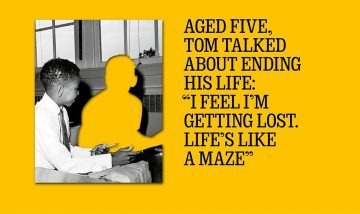Maggie Fergusson in MIL:
 Tom remembers the day he decided he wanted to be a theoretical astrophysicist. He was deep into research about black holes, and had amassed a box of papers on his theories. In one he speculated about the relationship between black holes and white holes, hypothetical celestial objects that emit colossal amounts of energy. Black holes, he thought, must be linked across space-time with white holes. “I put them together and I thought, oh wow, that works! That’s when I knew I wanted to do this as a job.” Tom didn’t know enough maths to prove his theory, but he had time to learn. He was only five. Tom is now 11. At home, his favourite way to relax is to devise maths exam papers complete with marking sheets. Last year for Christmas he asked his parents for the £125 registration fee to sit maths GCSE, an exam most children in Britain take at 16. He is currently working towards his maths A-level. Tom is an only child, and at first Chrissie, his mother, thought his love of numbers was normal. Gradually she realised it wasn’t. She would take him to lectures about dark matter at the Royal Observatory in London and notice that there were no other children there. His teacher reported that instead of playing outside with other kids at breaks, he wanted to stay indoors and do sums.
Tom remembers the day he decided he wanted to be a theoretical astrophysicist. He was deep into research about black holes, and had amassed a box of papers on his theories. In one he speculated about the relationship between black holes and white holes, hypothetical celestial objects that emit colossal amounts of energy. Black holes, he thought, must be linked across space-time with white holes. “I put them together and I thought, oh wow, that works! That’s when I knew I wanted to do this as a job.” Tom didn’t know enough maths to prove his theory, but he had time to learn. He was only five. Tom is now 11. At home, his favourite way to relax is to devise maths exam papers complete with marking sheets. Last year for Christmas he asked his parents for the £125 registration fee to sit maths GCSE, an exam most children in Britain take at 16. He is currently working towards his maths A-level. Tom is an only child, and at first Chrissie, his mother, thought his love of numbers was normal. Gradually she realised it wasn’t. She would take him to lectures about dark matter at the Royal Observatory in London and notice that there were no other children there. His teacher reported that instead of playing outside with other kids at breaks, he wanted to stay indoors and do sums.
One day his parents took him to Milton Keynes to have his intelligence assessed by an organisation called Potential Plus, formerly the National Association for Gifted Children. “We told him it was a day of puzzles,” Chrissie says. “It was my dream world,” Tom says. “Half a day of tests!” His mother waited while he applied his mind to solving problems. When they were shown the results, Tom’s intelligence put him in the top 0.1% in Britain. Precocious children are often dismissed as the product of pushy, middle-class parents. Nurture and environment clearly do play an important role in any child’s intellectual development. Talk to your child about politics over the dinner table and he is likely to develop confident opinions about the way the world should be run. Suggest that your toddler think of slices of cake in terms of angles and she may well display an early aptitude for mathematics. Practice can make perfect. The child with a gift for playing the piano who practises five hours a day is more likely to end up performing at Carnegie Hall than the equally gifted one who plays for just 20 minutes a week.
More here.
